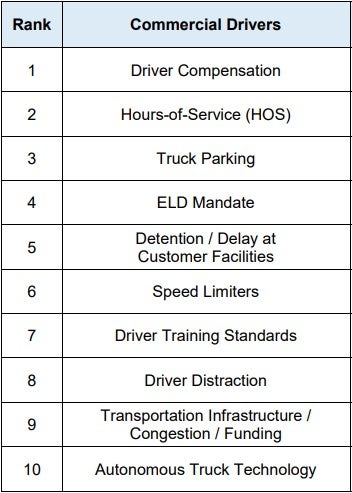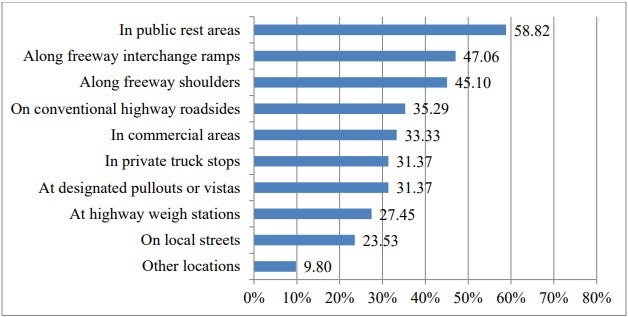A long-awaited assessment on truck parking capacity in the U.S. is expected to be ready for publishing by the Federal Highway Administration (FHWA) before the end of this year.
An updated Jason’s Law survey, which was initially scheduled to be published before the end of 2019 only to be postponed to the first months of this year, will now be made public during an upcoming virtual meeting of the National Coalition of Truck Parking, according to FHWA.

Coalition members include the Federal Motor Carrier Safety Administration, along with representatives from the trucking industry, commercial vehicle safety officials, state departments of transportation, and commercial truck stop owners and operators. The FHWA confirmed on Wednesday that data analysis is complete and the report is being cleared for publication.
Caitlin Hughes, director of FHWA’s Office of Freight Management and Operations, said that “key capacity data” from the survey will be posted to the web in advance of the meeting. “This data may be of use to states and others who are working on truck parking plans or need updates for freight planning and analysis.”
An activity report released Wednesday from the coalition’s working group stated that in addition to statutory requirements calling for periodic updates to the first Jason’s Law survey released in 2015, the project will update progress made since the 2015 survey to:
- Update the inventory of truck parking and identify improvements to truck parking availability.
- Evaluate truck travel by state for the purposes of evaluating increases in truck parking demand.
- Evaluate the types of technology being used to monitor availability and demand that have resulted from recent advances in truck parking information systems and applications.
- Compile truck parking plans, studies, and projects completed by states and Metropolitan Planning Organizations (MPOs), particularly as it relates to new freight planning requirements of the Fixing America’s Surface Transportation (FAST) Act.
A cause that began with Hope
The 2015 Jason’s Law survey was the result of a truck parking movement started by Hope Rivenburg, whose husband, Jason, was murdered in 2009 while he slept in his cab at an abandoned gas station after being unable to find safe parking. The tragic event elevated the issue of the truck parking shortage to a national safety concern.
“The Jason’s Law update was supposed to be released last year, so it’s real important that it finally seems to be coming out,” Desiree Wood, president of the advocacy group REAL Women in Trucking, told FreightWaves. Wood, who has participated in state and local meetings with Hope Rivenburg to advocate for increasing truck parking capacity, said the updated data will be critical for states seeking federal funding for truck parking projects.

Source: State Department of Transportation Survey
“Educating the state is a huge part of this. When they meet a real truck driver, they pay attention – especially when you mention Hope and Jason’s story. A lot of people want to help, but the problem is that once meetings conclude, it’s difficult to get states and MPOs to follow through.”
Based on the first survey, states reporting the most severe challenges included New Jersey, Pennsylvania, New York, Virginia, Maryland, South Carolina, Connecticut, Massachusetts, Tennessee, Kentucky, Illinois, Iowa, Minnesota, Wisconsin, California, Washington and Oregon.
The survey found that regulations and restrictions related to driver hours of service influence route planning and parking decisions and can be a challenge for drivers when a trip is delayed or changed but rest hours are necessary.

In addition, “the added aspect of congestion means that there could be low reliability and high variability in route planning and identification of truck parking locations that work with delivery schedules. Delay may cause the truck driver to have to rethink routing and identify other truck parking options,” according to the 2015 survey.
Truck parking ranked No. 3 on the latest list of top 10 trucking issues cited by commercial drivers, according to the American Transportation Research Institute.
A need for legislation
The Owner-Operator Independent Drivers Association (OOIDA), which worked to get bipartisan truck parking legislation introduced in March incorporated into a major infrastructure package passed by the House of Representatives in July, will likely see both efforts come up short as no action on either bill is expected by the end of the year.
However, “the parking issue is one that we’ve been fighting for years, and we’ll continue to push for that in the next highway bill or any stand-alone legislative opportunity as well,” OOIDA Executive Vice President Lewie Pugh told FreightWaves last month.
According to the latest update from FHWA, future priorities of the truck parking coalition will:
- Explore contractual relationships between truck stops and fleets for fuel purchases.
- Consider how to implement staging in urban and suburban zones.
- Hold a peer exchange with international partners and stakeholders to discuss parking capacity.
- Analyze the use of truck parking fees as a revenue source for private and public parking.
- Analyze tax incentives for the private sector to build new parking capacity.
- Track the amount of money being spent and types of projects being developed by states for truck parking projects.
Related articles











J. Griffin
One way to add additional parking is to force every state that operates a fixed weigh station, to provide 500 spaces per station. They can provide it all in one location or split half before and half after. They are running the stations to maintain safe roads and making money on violations to boot. For those states who close weigh stations to circumvent the spaces will have to limit their pop ups to a location where they can provide at minimum 250 parking spots. If a state runs 4 fixed location, that’s 2000 additional spots.
California has the worst truck to parking ratios, leaving hundreds of trucks fending or fighting for safe parking. Then get a swift kick in the head when they find a $100 parking ticket on their window. But they have no problem running 43 fixed weigh stations. With previous spot to station ratio, the state of California would have to provide 21,500 additional parking. It’s just a thought.
Tax incentives for Truck Stops to expand their parking lots. Withholding highway project money for states that don’t have an adequate number of spaces based on truck traffic in and out of their state. Staes that are building or repairing roads, often, level an area near the jobsite for equipment, sand and gravel piles. When project is complete, they could easily cover the area in left over gravel, or crushed asphalt and concrete to provide additional parking. When a business, such as a mall or a big box store closes, the buildings are often left as a reminder of tough times, but often chain off the very large parking areas. Open them up for trucks.
These are all just ideas, I’m sure there are more ideas to improve parking, it’s just a matter of putting some of them into place. Drivers are full of thoughts on every subject on the list, somebody just needs to listen to them. Such as delays at shippers and receivers can be solved, but as long as trucking companies are afraid of losing any business, they won’t even think about implementing them. That’s when the government steps in and issues changes to existing laws that have more teeth.
Cheryl
These are all really good ideas. You first need an advertising campaign and get taxpayers behind you. The state would have to maintain the area. Trash receptacles provided and routinely picked up. Truckers also would need to be responsible citizens and not leave their trash behind on the lot. I’ve seen the trash scattered all over truck stops and that doesn’t say anything positive about the profession’s disregard for the environment. And come on, stop the peeing all over the parking area. If you want state or federal parking to provide this, then be respectful of the gift from the taxpayers. Truckers need to unify. Call or email your state and federal and representatives and demand action on the parking crisis in America.